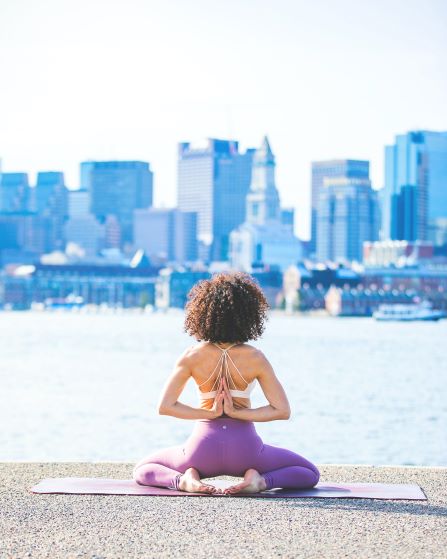The Real Goods on Meditation

Self-care and stress management can feel like just one more item to add to our to-do list. How can we talk about meditation without making it one more thing that stresses us out?
What I love is anyone can meditate. There are many approaches and none are wrong. All of them have been studied in depth and show excellent health outcomes often outweighing other interventions including pharmaceuticals. When it comes to health and happiness this is the magic bullet. A solo practice can nurture introverts who require more time alone. Group retreat can provide a new kind of social contact to unwind trauma.
I hear people say they can’t meditate. “My mind never gets quiet.” A different view or understanding is needed regarding what meditation actually is. Fundamentally it is the opposite of doing anything including judging what is happening. The point is to stop, step away from everything external and just see what’s there. At first what we discover includes the full range of human experience. Then we may start to feel a bit of space emerging. What is in this space after we settle into our body a little? All that is good about being human including wisdom and joy.
The Science Behind Meditation
A recent meta analysis done by the Journal of American Medicine reviewed nearly 19 000 research studies on meditation. The results were stunning across the board. In just 8 weeks anxiety was reduced in the majority of people. After 3 to 6 months of practice, 78% of those suffering from anxiety enjoyed significant benefits. This meta analysis concluded that meditation lowers depression in 70% of people and reduces pain in 67%. This may be related to its ability to increase serotonin and dopamine levels in the brain. So let’s talk more about the brain and then we’ll get more into the stress response.
A study done in 2004 at the University of Wisconsin by Richard Davidson looked at long time meditators. Using an EEG it was determined that not just brain waves changed during meditation but there were also permanent structural changes. Meditators have a thicker brain and more folds on the surface. They are also able to induce gamma waves at levels not seen in the rest of the population.
Changing the Brain
The control tower for the endocrine or hormone system is in the brain. The amydala interprets stress and is responsible for emotions, instincts and memory. It also has a role in libido. Psychological stressors like to-do lists and deadlines create the same physiological stress response as being in immediate danger. We know that women are more at risk for have a dysregulated stress response. The #me too phenomenon explains in part why this is. Chronic issues with gut, thyroid and HPA (hypothalamus, pituitary, adrenal) function are all too common these days. Shiny, new, high tech interventions are not where we are finding answers.
When my health issues began, my gut instinct was to move away from conventional medicine and literally go meditate in the mountains. I found my doctor there. Gradually returning to dance and martial arts training was part of the answer. Movement and strength training is important as long as it is enjoyable. It triggers human growth hormone and stimulates a cascade of changes that makes us feel safe on a fundamental, somatic level.
Neuroplasticity or the brain’s ability to change goes on throughout our lives. It is not limited to just babies as we once thought so we can always begin wherever we are. You may recognize these words from Pema Chodron.
Focus, Attention and Addiction
ADD is a common diagnosis in children whereas it seems under diagnosed in women. This is another area where pharmaceuticals are the primary intervention. However, the long-term evidence is not convincing. Young people are being exposed to meditation more and more because of how effective it is. In terms of substance use, meditation, cognitive behavioural therapy and acupuncture are some of the best tools for building resiliency.
A wave of research on meditation occurred after a conference where the Dalai Lama urged scienctists to go in this direction. Research is currently being done at the University of Victoria by a professor who is part of the meditation community I practice with.
“Every day, think as you wake up, today I am fortunate to be alive, I have a precious human life, I am not going to waste it. I am going to use all my energies to develop myself, to expand my heart out to others; to achieve enlightenment for the benefit of all beings. I am going to have kind thoughts towards others, I am not going to get angry or think badly about others. I am going to benefit others as much as I can.”
-H.H. The 14th Dalai Lama
Related Posts
 A Sense of Belonging or Coming Home
A Sense of Belonging or Coming Home





